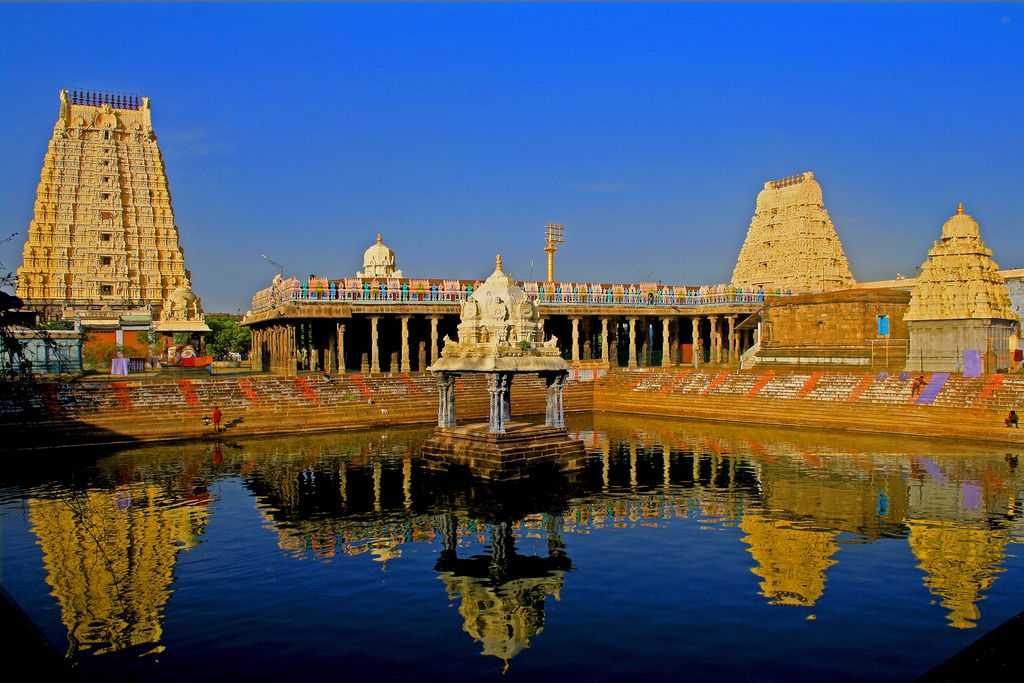Why is Kanchipuram Known as the City of Temples? Kanchipuram, located in the Indian state of Tamil Nadu, is a city known for its deep cultural roots, religious importance, historical legacy, and craftsmanship. The city holds a distinct place in Indian tradition and continues to attract thousands of visitors each year, drawn to its temples, history, silk weaving, and spirituality. Here’s an exploration of why Kanchipuram stands out:
1. Spiritual and Religious Significance
Kanchipuram is one of the seven Moksha-puris (sacred cities) in Hinduism and holds a special place in the hearts of millions of devotees. Known for its many ancient temples, Kanchipuram serves as a major pilgrimage destination. The city has a rich spiritual heritage, being the home of revered temples dedicated to Lord Shiva, Lord Vishnu, and the Goddess Kamakshi.
-
Famous Temples: The Kailasanathar Temple, dedicated to Lord Shiva, is an example of early Dravidian architecture and is admired for its intricate stone carvings and architecture. Similarly, the Varadaraja Perumal Temple, dedicated to Lord Vishnu, is an essential pilgrimage site for devotees of Vaishnavism. Kanchipuram’s Ekambareswarar Temple and the Kamatchi Amman Temple also stand as sacred spots with rich cultural and religious value.
2. Historical Legacy
Kanchipuram has been a significant city throughout South India’s history. It was once the capital of the Pallava dynasty during the 6th to 9th centuries CE. The Pallavas were instrumental in promoting art, culture, and architecture, laying the foundation for what would become South India’s signature Dravidian temple design. The city later saw rule from the Cholas, Vijayanagar Empire, and Marathas, each leaving a mark on its cultural landscape.
This long history is evident in the city’s monuments, architectural styles, and the spiritual practices that have continued uninterrupted for centuries. These dynasties also contributed to Kanchipuram becoming a center for education, literature, and religious scholarship.
3. Kanchipuram Silk
Kanchipuram is world-famous for its silk weaving tradition, particularly its iconic Kanchipuram silk sarees. Known for their exceptional quality, these sarees are made using pure mulberry silk and feature intricate zari work (gold or silver threads). The designs often include motifs inspired by nature, temples, and religious symbols, making them highly regarded in India and abroad.
The art of weaving silk in Kanchipuram dates back over a thousand years. The city’s silk weavers are renowned for their craftsmanship and attention to detail. Kanchipuram sarees have become synonymous with luxury, frequently worn during significant occasions such as weddings and religious ceremonies.
4. Cultural and Artistic Hub
Kanchipuram’s influence extends beyond religion and history; it is also a vibrant center of cultural and artistic expression. The city has a rich tradition in Bharatanatyam, one of India’s oldest classical dance forms. It has been a hub for the arts, attracting dancers, musicians, and artists who draw inspiration from the city’s temples and heritage.
Additionally, Carnatic music, another cultural treasure of Tamil Nadu, flourished in Kanchipuram and surrounding areas. The presence of prominent scholars, spiritual leaders, and musicians has ensured that Kanchipuram continues to be a living cultural center.
5. A Center of Learning and Philosophy
Historically, Kanchipuram has also been a vital center of spiritual and philosophical thought. The city is closely associated with Adi Shankaracharya, the great philosopher and theologian who established one of the four mathas (monastic orders) here in the 8th century. His work in consolidating Hindu philosophy, especially the doctrine of Advaita Vedanta, had a profound impact on the religious landscape of India.
For centuries, Kanchipuram has been a place where intellectual and spiritual discourse flourished. The city attracted scholars and spiritual seekers, creating an environment where knowledge and wisdom were passed down through generations.
6. Temples, Festivals, and Pilgrimages
Kanchipuram is also famous for its religious festivals, which draw pilgrims and tourists alike. Some of the major festivals include the Panguni Uthiram festival, which celebrates the divine marriage of Lord Vishnu and Goddess Lakshmi, and the Varadaraja Perumal Temple Festival. During these events, the temples come alive with rituals, processions, and cultural performances, creating an immersive spiritual experience.
These festivals offer a unique opportunity to witness the confluence of art, devotion, and culture, making Kanchipuram a must-visit destination for those seeking to understand the spiritual essence of Tamil Nadu.
7. Educational and Philosophical Influence
In addition to its cultural and religious prominence, Kanchipuram has long been a leading educational and philosophical center. The Kanchi Paramacharya, the head of the Kanchi Mutt, has long been a revered figure in Hinduism. The city continues to attract students and scholars who seek to learn about the Vedantic traditions and ancient Indian philosophy.
Conclusion
Kanchipuram is a living testament to the deep cultural, religious, and historical fabric of South India. Whether you’re visiting for its divine temples, to admire its artistic traditions, or to learn about its historical legacy, the city offers a wealth of experiences that connect the past with the present. The rich combination of sacred sites, intellectual heritage, and artisanal mastery in silk weaving make Kanchipuram a unique city with an enduring legacy that continues to inspire and attract people from all walks of life.




